Today we want to talk about AI for car dealerships. Why? As a company that cares deeply about high-quality experiences across various sectors and develops fully custom AI solutions to make that happen, we’re constantly researching the challenges our clients face.
For example, we recently conducted a small survey to discover the problems car owners and drivers encounter and their expectations for automotive AI agents that could address these issues. You can check some key insights on our LinkedIn page.
But that’s not the main point. One intriguing use case mentioned by Tetiana Krasota, our Director of Partnerships, was the difficulty of purchasing a used automobile. And she’s definitely not alone. We found that over 70% of Americans reported disliking at least one aspect of the car-buying process at a dealership in 2024. And support service is just one of the toughest bottlenecks in the automotive retail sector.
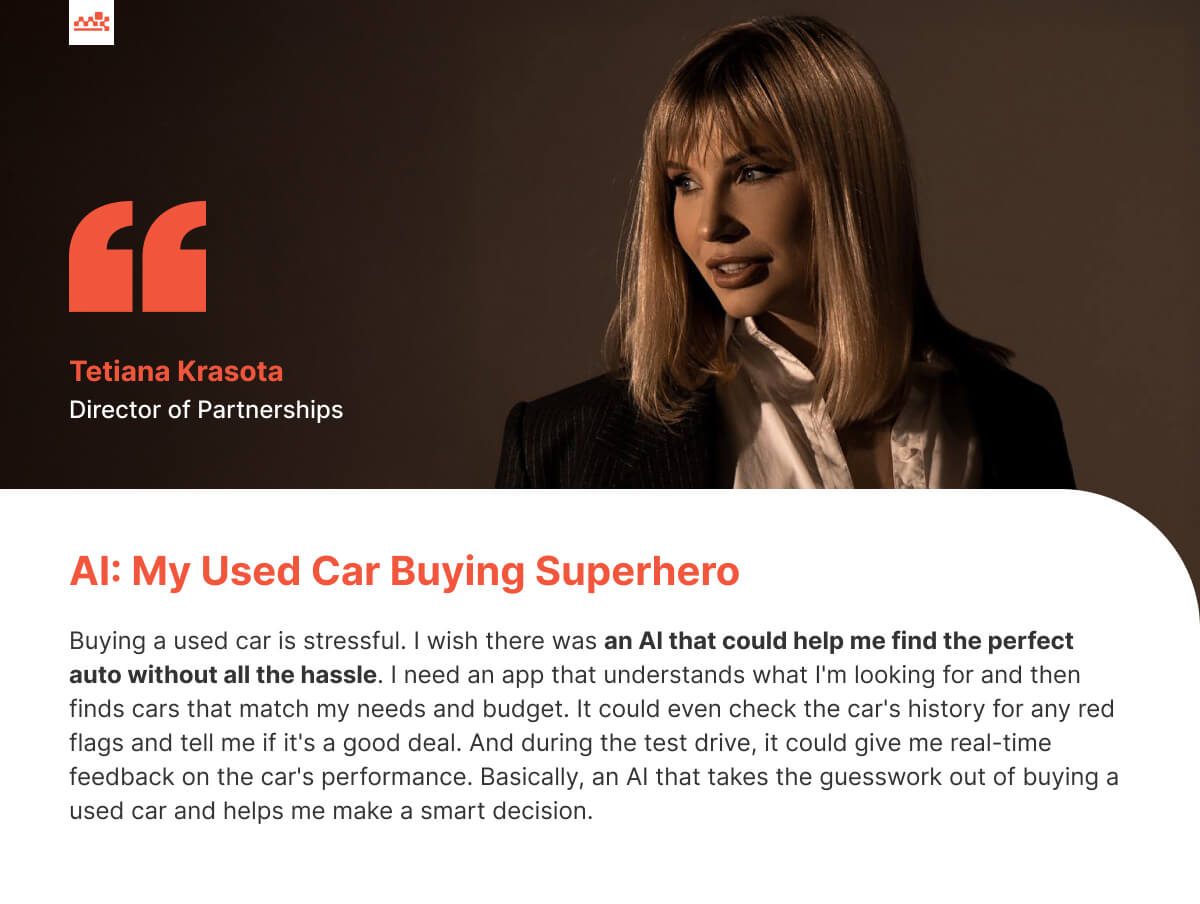
This is where things get interesting. We’ve seen countless articles about the setbacks and remedies for auto sales in 2026. Yet, surprisingly, few explore the possibilities of ai-driven automotive solutions in automotive dealerships from this crucial angle – a huge missed opportunity, in our opinion. We believe that intelligent applications have the potential to eliminate or significantly ease many of these problems.
To demonstrate this, we’ll examine the top three concerns and offer concrete AI-powered solutions with specific recommendations. Our goal? To help both ease the burden for companies and improve client satisfaction – the very thing we and our partners strive for every single day. So, let’s dive in.
Table of Contents
Where Dealerships Struggle: Top Challenges in 2026
Get real-world AI examples from the biggest automotive companies and apply them to your business.

Challenge #1: The Customer Service Conundrum
It’s no surprise that client care reigns supreme as the #1 roadblock for car retailers. It’s particularly alarming given that the service department is a crucial revenue driver. Let’s unpack the core issues:
- Difficulty Managing Expectations: Buyers today desire a seamless, fast, and transparent purchasing journey. In fact, the automotive sector is among the top four industries where consumer demands are sky-high. They want information readily available, and they want it now.
- Fragmented Communication Channels: Customers want to connect with businesses on their preferred medium. More specifically, 75% of consumers crave a consistent experience across all touchpoints – whether it’s social media, in-person visits, phone calls, or live chat. Too often, dealerships lag in offering omnichannel support.
- Slow Response Times: In the fast-moving world we live in, sluggish replies are a deal-breaker. Buyers abandon purchases due to long wait times and inefficient processes. Furthermore, it’s estimated that 35% to 50% of sales go to the vendor that responds first.
- Lack of Personalization: Every person, without exception, wants to feel valued. To be exact, 71% of consumers expect personalized interactions, and 76% get frustrated when they don’t receive them. Generic responses and a one-size-fits-all approach simply won’t cut it.
- Inadequate Follow-Up Processes: Regular check-ins are essential for closing deals, yet it’s often a major pain point for dealerships. The data shows that an average of five follow-ups are needed to close 80% of deals. Without a structured and automated system, opportunities are easily lost.
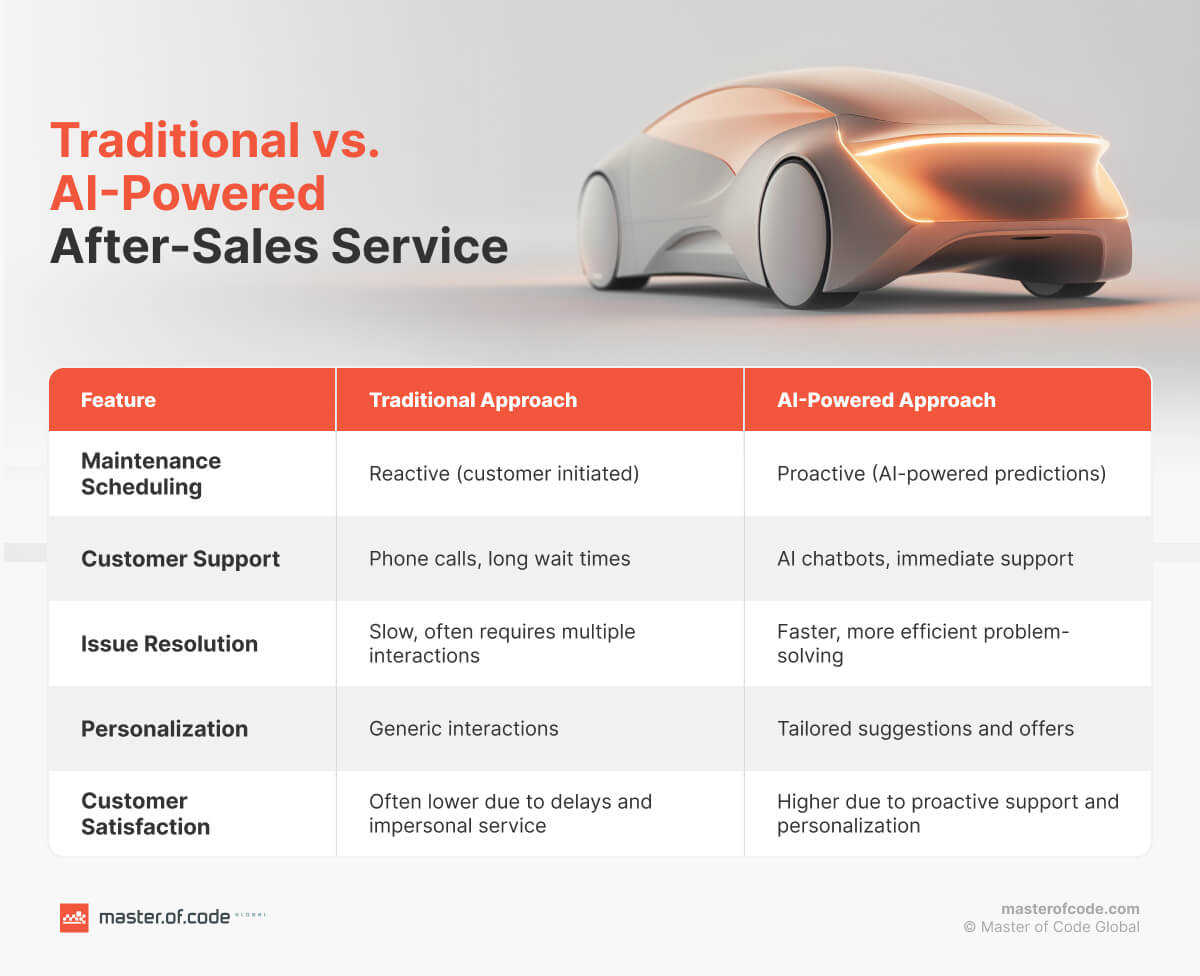
Challenge #2: The Sales Slump
The numbers don’t lie. According to Statista, annual passenger car sales in the United States have been steadily declining since 2014, dropping from 7.71 million units to 2.98 million in 2024. While modest growth (2-3%) is projected for 2026, the overall picture remains challenging. Several factors contribute to this decline, many of which are outside a dealership’s direct control – rising insurance premiums, soaring fuel prices, and increased interest costs, to name a few.
However, dealerships can focus on what they can control: retention. This is a critical area, especially considering the average sector loyalty of just 51.5%. Providing exceptional service and building strong relationships is key to encouraging repeat business for future repairs, maintenance, and vehicle purchases. Optimizing the process, implementing more tailored approaches, and offering attractive special offers are also vital. Why is this so important? Because every 1% rise in sales retention translates to a $700 million increase in revenue annually across the industry – an average of $150,000 per dealer.
Challenge #3: Marketing Misses
Consider these numbers: the average conversion rate for automotive businesses is a mere 2%, yet high performers achieve rates as high as 16%. The average dealership generates 166 qualified sales leads monthly, but 13.3% of prospects never even make it into the CRM. Auto retailers close only 12.5% of leads, and 23.5% of those are flagged for no follow-up within 24 hours – with 67.3% remaining untouched a week later. These statistics highlight a critical issue: companies are struggling to effectively manage and nurture their prospects. This is exactly where AI lead generation for car dealers becomes a strategic advantage—automating capture, qualification, and follow-up at scale while eliminating human bottlenecks.
Outdated dealer management systems (DMS) and manual processes are often to blame. Many companies lack good tracking tools, missing out on valuable behavioral insights. Without this data, communication becomes generic and fails to resonate. Effective lead nurturing is essential, especially given that car buyers can take weeks or even months to make a purchase decision. Without artificial intelligence in automotive marketing for proper monitoring and process automation, engagement strategies become nearly impossible to implement, leading to lost opportunities and decreased deals.
Turning Challenges into Opportunities with AI for Car Dealerships
Our 20+ years of experience building tailored intelligent applications for diverse clients has shown us that customized tools, developed by experts, can effectively address some of these problems. Here’s a quick overview of various AI applications in the automotive sector.
#1. AI-Powered Chatbots
Car dealership chatbots are far more than just simple answer machines. Their true power lies in their ability to be trained on vast datasets and seamlessly integrated with available systems. Some real-world applications of bots include:
- Offering instant answers to common questions about vehicle specs, pricing, availability, operational hours, and service procedures.
- Simplifying appointment arrangements, which translates to enhanced consumer convenience. In fact, automotive AI scheduling is paramount for any dealership, as nearly 40% of car buyers prefer booking test drives online.
- Presenting preliminary trade-in value estimates based on details provided by users.
- Assisting with basic troubleshooting and maintenance inquiries, directing customers to helpful resources, or escalating to human agents when necessary.
- Collecting prospects’ information for deals, ensuring no potential buyer slips through the cracks. AI in automotive sales can also be used to personalize vehicle recommendations and tailor financing options to individual needs.
- Processing warranty claims and service requests, streamlining the process for both clients and staff.
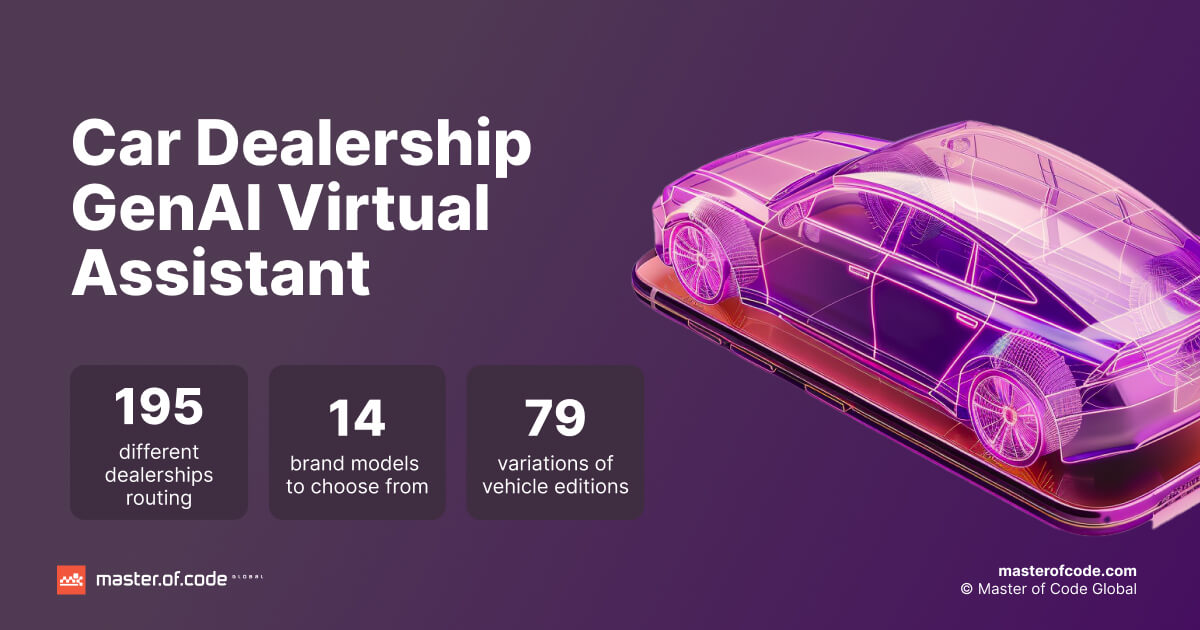
Want to see it in action? Check out our recent project – an un-authenticated web messaging solution. It features an FAQ bot powered by Generative AI, complete with complex routing for 195 different dealerships. This assistant delivers personalized interactions, connecting buyers with retailers, providing instant support, and even facilitating test drive bookings.
#2. Voice Assistants
Voice-powered customer support for dealers offers a new level of convenience and personalization. Let’s take a look at key use cases:
- Answering basic vehicle maintenance questions for quick and easy assistance.
- Delivering directions to dealership locations, making it easier for clients to find their way.
- Handling incoming calls and intelligently routing them to the appropriate departments.
- Providing hands-free car data during test drives, enhancing the overall experience and safety.
- Guiding consumers through automobile features and controls, ensuring they understand all the functionalities.
- Gathering vital customer data for business insights through automotive AI speech analytics to understand buyer preferences and possible frustrations.
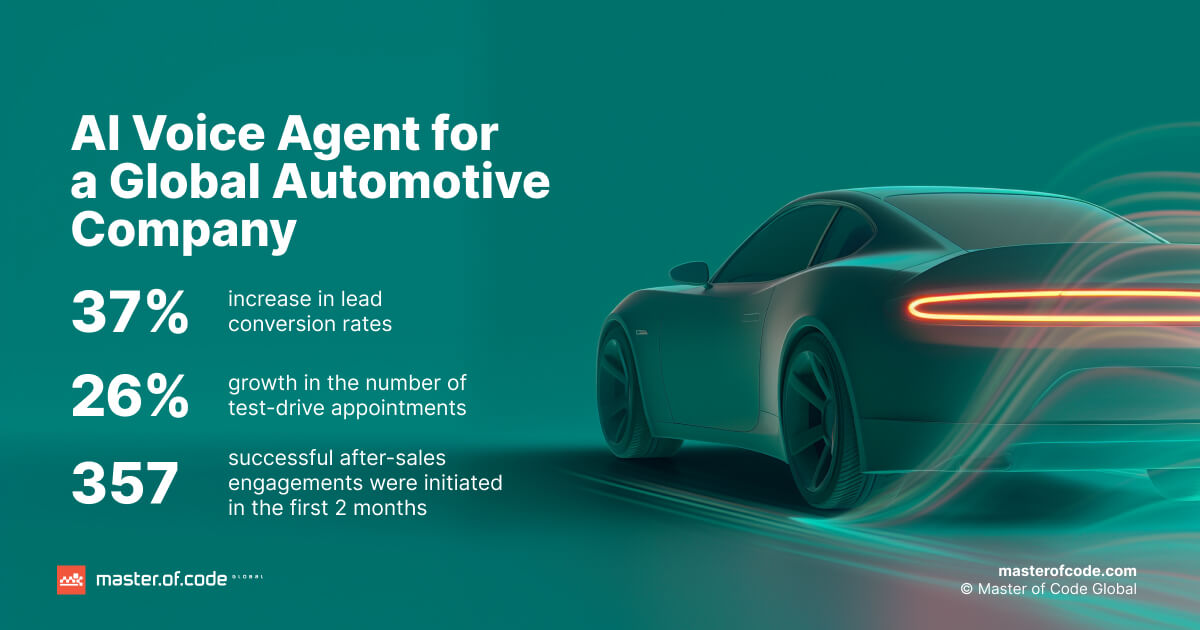
Examples? We recently developed an automotive AI voice agent. This custom solution provides 24/7 support, tailored guidance, and proactive after-sales engagement. It has already delivered impressive results, including a 37% increase in lead conversion rates and a 26% growth in test-drive appointments. Check the demo here.
#3. AI Agents
These systems can take on more complex tasks, guaranteeing fully individualized assistance and automating key processes like:
- Generating personalized vehicle recommendations based on one’s preferences, budget, and driving needs.
- Creating bespoke financing packages, tailoring loan terms and interest rates to individual buyers.
- Providing virtual vehicle tours and demonstrations, showcasing key features and benefits.
- Cross-selling accessories and add-ons, increasing revenue.
- Supporting automatic follow-ups with leads, ensuring timely communication and maximizing conversion.
- Assisting with paperwork completion and streamlining the sales process. Moreover, with AI in automotive after-sales services, agents can also be used to boost retention strategies, like offering discounts on maintenance or points-based rewards for service visits and referrals.
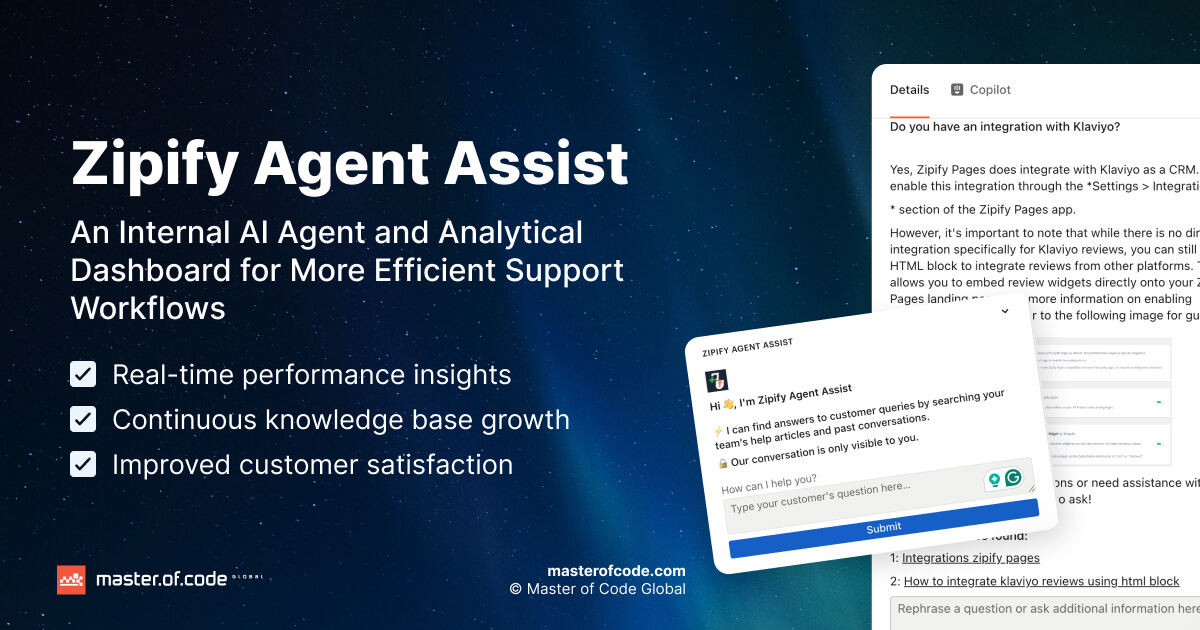
A prime illustration of effective AI agent technology is our Zipify case. It combines an AI-powered virtual assistant for support managers with a comprehensive analytical dashboard. The benefits are significant, including increased efficiency in operations, continuous knowledge base growth, enhanced agent performance, improved satisfaction, and more.
#4. Predictive Analytics Tools
Such solutions can provide valuable insights into customers and market shifts, enabling proactive service recommendations and powering targeted marketing. Predictive AI maintenance in automotive exemplifies this by proactively addressing possible car issues, improving reliability, and reducing unexpected repair costs. Other practical applications are:
- Predicting future inventory needs and optimizing supply levels to avoid overstocking or stockouts.
- Determining potential buyers according to browsing behavior and online activity.
- Planning for vehicle upkeep based on car data and historical patterns—a prime example being AI-powered automotive repair, which greatly benefits drivers and boosts loyalty.
- Calculating optimal pricing strategies to maximize profitability.
- Identifying at-risk consumers for retention and implementing targeted offerings.
Take for example Motorway, a UK-based online car marketplace. They developed a tool that uses ML to produce accurate valuations for used cars. It analyzes various factors, including vehicle details, market trends, and even real-time auction data, to give sellers an instant and transparent picture of their car’s worth. Their model delivered a 2% revenue increase in 2023 and was projected to deliver 15-17% in 2024.
Wrapping Up
While many companies are still contemplating AI adoption, forward-thinking leaders are already reaping the rewards of intelligent automation and transforming the auto retail landscape. At Master of Code Global, we go beyond simply implementing technology; we craft purpose-built systems that deliver real-world impact.
Our deep expertise in AI in automotive dealerships allows us to understand your unique challenges and design tailored applications that enhance customer experiences, optimize operations, and drive revenue growth. We’ve witnessed firsthand how custom AI solutions can turn traditional pain points into competitive advantages, and we’re confident we can do the same for you.
Ready to write your own success story? Let’s explore your vision and engineer an AI solution that’s as distinctive as your dealership. The future of automotive retail is being written right now – let’s make sure your brand is leading the way.
Ready to build your own Conversational AI solution? Let’s chat!






